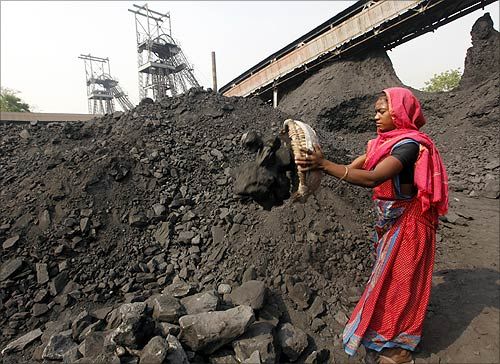 | « Back to article | Print this article |
 The Supreme Court's verdict terming the allocation of 218 coal blocks illegal has put lenders with over Rs 7,70,000 crore (Rs 7.70 trillion) exposure to the power and steel industries in a spot.
The Supreme Court's verdict terming the allocation of 218 coal blocks illegal has put lenders with over Rs 7,70,000 crore (Rs 7.70 trillion) exposure to the power and steel industries in a spot.
They have now swung into action to assess the client-wise impact on their individual loan books.
The court will decide the fate of individual allocations in its hearings starting September 1.
A large number of public sector banks, which are already reeling from stressed assets, may face further pressure as some of the borrowers may be unable to repay loans.
"Lack of supplies (fuel and raw material) puts the viability of operations (of power and steel) companies into question. Naturally, we are very worried about asset quality now," says a senior executive with the State Bank of India (SBI), who does not wish to be identified.
The gross bank credit to power and iron & steel sector was Rs 7,73,000 crore (Rs 7.73 trillion) in June.
Of which, the power sector's exposure was Rs 5,08,000 crore (Rs 5.08 trillion) and the iron and steel sector's was Rs 2,65,000 crore (Rs 2.65 trillion), according to Reserve Bank of India data.
These numbers show overall exposure and are not a reflection that all loans are going to be impacted.
The country's largest bank, SBI, had lent Rs 1,53,136 crore (Rs 1.53 trillion) to the infrastructure sector, according to data till June.
Of this, exposure of Rs 92,919 crore (Rs 929.19 billion) is to the power sector. Indian Banks' Association chief executive M Tanksale says both the power and steel sectors are already under stress.
And, the effect of the verdict may have further implications on asset quality.
"It will be desirable to allow mines to continue operation with riders based on what the Supreme Court decides. Power is a crucial segment," says Tanksale.
Another senior power sector executive says this may have an adverse impact on the loan repayment capacity of affected companies from the power and steel industries.
These industries already have a significant share in stressed assets that are being restructured or have been declared non-performing.
The country has 250,257 Mw of installed power generation capacity. Of this, nearly 60 per cent is coal based.
India's domestic coal production has not been able to match the demand for fuel from the new power plants that have come in the past 5-10 years.
"It is certainly negative for the power sector and the impact would depend on the final verdict, which could bring de-allocation or penalty," says Bhargav Buddhdev, an analyst with domestic brokerage Ambit Capital.
"The impact could be harsher on the beneficiary companies which have already made significant investments to make these coal mines operational," he says.
"There would be some negative impact on banks but to quantify that we will have to wait for the final judgement. The impact, however, would be more harsh on power companies," says S Naren, chief investment officer at ICICI Prudential AMC.